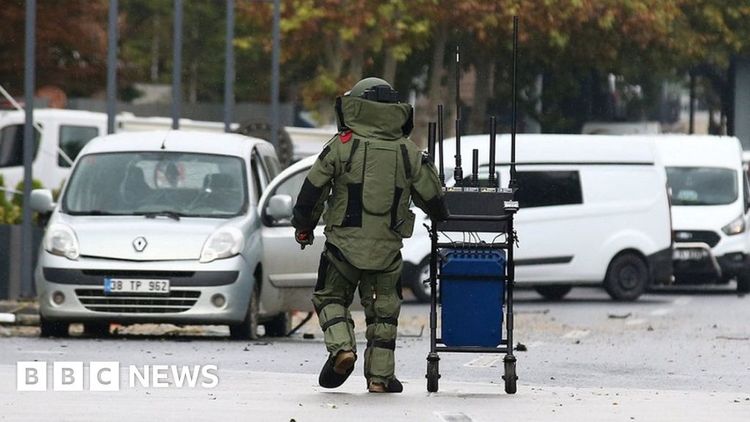Turkey strikes Kurdish rebels after Ankara blast

Check out: The security camera footage captures the exact second of the recent explosion in Turkey.
Turkey has announced that they have conducted several aerial attacks against Kurdish insurgents located in northern Iraq. This statement was made shortly after a destructive suicide bombing occurred at the interior ministry's headquarters.
According to the government, 20 objectives were eliminated, and several fighters of the prohibited PKK insurgent faction were rendered inactive.
A group connected to the PKK claimed responsibility for the bombing that occurred in Ankara on Sunday morning. The bomber, who was a member of the group, detonated himself.
Police took down another assailant and two law enforcement officials sustained injuries.
In Turkey, the EU, UK and US, the Kurdistan Workers' Party (PKK) is regarded as a terrorist organization.
The defense ministry of Turkey stated that the air strikes on Sunday were aimed at caves, storage spaces, and military fortifications utilized by the PKK.
According to AFP, they informed that the mission was executed with the intention of "eliminating the threat of PKK and other extremist organizations, curtailing the possibility of terrorist strikes from the north of Iraq targeting our people and security personnel, and guaranteeing the safety of our borders."
According to Rudaw, a news agency covering Kurdish news, the attacks were specifically aimed at Mount Qandil, which is located close to the border with Iran and is reportedly a prominent base for the Kurdistan Workers' Party (PKK).
These actions took place after a blast occurred on Ataturk Boulevard in Ankara, just a few hours prior to the parliament's scheduled reopening after the summer recess.
An individual trained in the art of bomb disposal is present at the location of the explosion that occurred in Ankara.
The Immortals Battalion is a group that admitted to targeting the ministry due to its proximity to parliament. They stated that this was their reason for doing so.
The occurrence started at approximately 09:30 (06:30 GMT) when one of the assailants got out of their vehicle and hurled a compact explosive device towards the ministry building to divert the attention of security personnel.
Subsequently, the next assailant fired upon the security personnel stationed at the entrance of the government building and then proceeded to trigger an explosion by means of a suicidal bomb.
As for the initial individual, they swiftly entered the enclosure and were promptly eliminated by law enforcement.
Two members of law enforcement sustained injuries - one was struck by a bullet to the torso, while the other was harmed in their legs and an ocular organ.
Ali Yerlikaya, who is in charge of the Interior Ministry, informed journalists that all the injuries sustained were not severe enough to cause loss of life.
According to a high-ranking security personnel from Turkey, the culprits seized their car on Saturday within Kayseri, a metropolis located around 260 kilometers away from the capital Ankara.
According to reports, they killed the driver of the car who was a 24-year-old veterinarian driving in a rural area.
According to the government spokesperson, they are currently examining security camera recordings from Kayseri leading up to the Syrian border in order to identify the origin of the suspects.
An immense blast occurred mere hours prior to the scheduled meeting time of parliament.
During his address to parliament, President Recep Tayyip Erdogan characterized the assault as "the terminal spasms of extremist violence."
He mentioned that those wicked individuals who targeted the tranquility and safety of our populace were unsuccessful in achieving their objectives and will never be able to do so.
The Kurdish rebels are facing strong resistance from the government, as their leaders have been imprisoned and military assaults have been carried out on Kurdish strongholds located both in Turkey and in neighboring countries such as Syria and Iraq.
The PKK emerged in the late 1970s with an ideology based on Marxism-Leninism. Starting from 1984, the group embarked on an armed rebellion against the Turkish authorities, seeking to establish a sovereign Kurdish state within Turkish borders.
During the 1990s, the PKK altered their stance from seeking sovereignty for their own state and instead advocated for greater independence for the Kurdish people. The long-standing conflict has resulted in over 40,000 casualties.
Violent clashes reignited following the expiration of a two-year truce in July of 2015.













































